Congenital syphilis is syphilis that passes from a pregnant woman to the fetus during pregnancy. Congenital syphilis can cause stillbirth and profound birth defects.
According to Centers for Disease Control and Prevention (CDC), 2,855 congenital syphilis cases were reported in 2021, the latest year with data, a more than 32 percent increase from 2020 when 2,157 cases were recorded.
In fact during the five year period between 2017 through 2021, cases of the devastating disease were up more than 200 percent—2017 (941), 2018 (1313), 2019 (1875), 2020 (2157) and 2021 (2855).
Arizona saw the highest rate of congenital syphilis in 2021 with 232.3 per 100,000 live births, followed by New Mexico, Louisiana, Mississippi and Texas rounding out the top five.
Concerning total congenital syphilis cases per state, Texas reported the most with 680 cases, followed by California (518) and Arizona with 181.
The CDC also reported 220 infant deaths caused by congenital syphilis in 2021, a 45 percent increase compared to the 152 deaths reported in 2020.
Over the five years from 2017 through 2021, syphilis cases rose from 101,590 to 176,713, a 74 percent increase.
Subscribe to Outbreak News TV on YouTube
The troubling congenital syphilis increases prompted The National Coalition of STD Directors (NCSD) to release the following statement:
“For a decade, we have been sounding the alarm on rising congenital syphilis cases, which have historically been regarded as sentinel events that are meant to alert a community to a failure of health systems. Sadly, the CDC’s new report about the first increase in the nation’s infant mortality is not surprising. Each of the 2,855 congenital syphilis cases in 2021 – including 220 infant deaths – told us that our public health systems were failing to protect babies and failing to save lives.”
“Many observers will note that maternal mortality is complicated and has many factors. But we need to reckon with a much simpler truth: there are consequences when investments in public health are inadequate. The consequence we see right now the death of infants.”
“This was a completely preventable disaster. These numbers call for the administration to renew investments in the public health infrastructure and for key leadership representing sexual, reproductive, and maternal health to come together to change the deadly trajectory we’re on,” said David C. Harvey, Executive Director of the National Coalition of STD Directors (NCSD).
Congenital syphilis (CS) can have major impacts on a baby’s health. How much CS affects a baby depends on how long the mother had syphilis and if, or when, treatment was received for the infection.
CS can cause:
Miscarriage (losing the baby during pregnancy),
Stillbirth (a baby born dead),
Prematurity (a baby born early),
Low birth weight, or
Death shortly after birth.
Up to 40% of babies born to women with untreated syphilis may be stillborn, or die from the infection as a newborn.
For babies born with CS, CS can cause:
Deformed bones,
Severe anemia (low blood count),
Enlarged liver and spleen,
Jaundice (yellowing of the skin or eyes),
Brain and nerve problems, like blindness or deafness,
Meningitis, and
Skin rashes.
Babies with CS can be without any symptoms at birth, but without treatment the baby can develop serious health problems in the first few weeks or few years after birth. Babies who do not get treatment for CS and develop symptoms later can die from the infection. They may also be developmentally delayed or suffer from seizures.






Each pregnant woman with early syphilis has had sex with a man who had infectious lesions. Health Departments need to prioritize the interviews and investigations for all men with infectious syphilis - primary, secondary and early latent less than one year, who have sex mostly with women, or with both men and women, to find and treat female sex partners. The interviews need to be in person, with trained and determined DIS, and can’t simply be a one-time encounter. Men with early syphilis who have sex with women should be a strategic focus for intensive interviews and investigations.